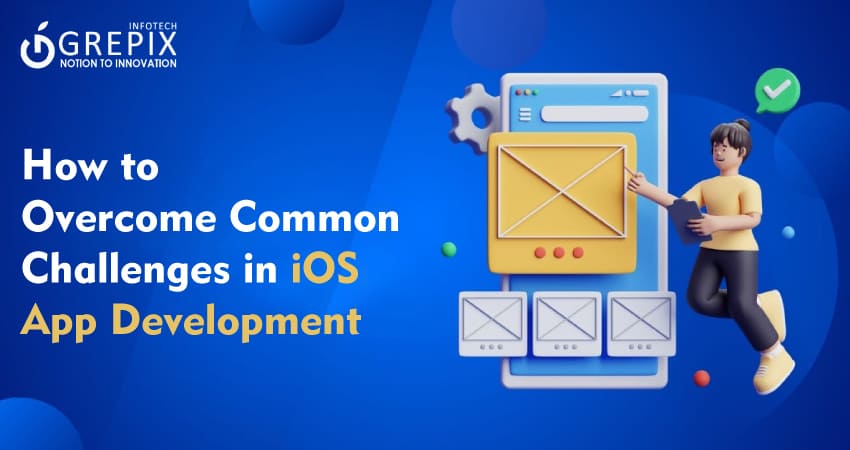How to Overcome Common Challenges in iOS App Development
In the dynamic world of mobile app development, creating applications for Apple's iOS platform comes with its own set of unique challenges. From stringent App Store guidelines to the diverse array of device capabilities and operating system versions, iOS developers must navigate a complex landscape to deliver quality applications. At Grepix Infotech, we've mastered these challenges through innovation, attention to detail, and a deep commitment to user experience. In this blog, we'll share the common hurdles we encounter in iOS app development and the effective strategies we use to overcome them. Whether you're a seasoned developer or new to the field, these insights will help you enhance your app development process, improve app quality, and ensure a smooth journey from concept to the App Store.
In the blog, Grepix Infotech shares insights on overcoming common challenges in iOS app development. Key areas addressed include adhering to stringent App Store guidelines, managing device and OS fragmentation, ensuring user privacy and data security, optimizing app performance and battery efficiency, and integrating third-party services. Solutions proposed involve rigorous testing, responsive design, minimal data collection, performance optimization, and staying updated with changes in programming languages and APIs. By embracing these strategies, developers can enhance app quality, meet Apple's high standards, and improve user satisfaction, effectively navigating the complexities of iOS app development and turning challenges into opportunities for growth.
1. Mastering the App Store’s Review Guidelines
Challenge
One of the initial hurdles in iOS app development is adhering to the stringent review guidelines set by Apple. Non-compliance can result in app rejection, which can delay launch plans and impact return on investment.
Solution
Start by thoroughly reviewing the App Store guidelines at the outset of your development process. Incorporate guideline adherence into your development workflow to ensure every feature and update complies. It's also beneficial to conduct internal reviews mimicking Apple’s review process to catch potential issues before submission. Engage in forums and developer communities to stay updated on any changes to these guidelines, as Apple updates them frequently.
2. Addressing Device and OS Fragmentation
Challenge
Apple frequently introduces new devices and updates its operating systems, which can result in fragmentation. Developers need to ensure that the app provides a consistent experience across all device and OS versions.
Solution
Use Apple’s extensive suite of device simulators to test the app across different devices and OS versions. However, simulate testing with actual devices to gauge real-world performance and user experience. Implementing responsive designs and using Auto Layout helps create flexible interfaces that adapt to different screen sizes and orientations effortlessly.
3. Ensuring User Privacy and Data Security
Challenge
With increasing scrutiny on data privacy, iOS developers must design apps that protect user data and comply with stringent privacy laws like GDPR and CCPA.
Solution
Encrypt sensitive data both in transit and at rest. Opt for minimal data collection—only gather data essential for app functionality. Regularly update your team on privacy practices and build these principles into your app’s architecture. Additionally, utilize Apple's built-in security features to enhance your app’s data protection capabilities.
Also Read: "The Impact of Cutting-Edge Technology on Ride-Hailing"
4. Optimizing Performance and Battery Efficiency
Challenge
Users expect swift and responsive apps that do not excessively drain battery life. Managing app performance while maintaining battery efficiency can be a complex balancing act.
Solution
Streamline your app’s performance by optimizing code and resources. Reduce the size of assets, and utilize more efficient algorithms. Tools like Xcode’s Instruments are invaluable for profiling an app’s resource usage and identifying areas for improvement. Regular performance testing during the development cycle can help in tweaking functionalities that impact battery life adversely.
5. Handling Third-Party Integrations
Challenge
Integrating third-party services and APIs can introduce complexity, especially if these services change, experience downtime, or pose security risks.
Solution
Choose reputable third-party services with robust APIs and clear documentation. Implement comprehensive error handling to manage downtime or data inconsistencies. Stay abreast of any API updates or changes that could impact your app, and plan for contingencies in your app architecture.
6. Adapting to Swift and Objective-C Evolution
Challenge
Apple’s Swift and Objective-C languages evolve continuously, with frequent updates that introduce new features and deprecate old ones.
Solution
Keep your development team updated with the latest changes in these languages. Regular training and participation in developer workshops can be very beneficial. Encourage your developers to contribute to and engage with Swift and Objective-C communities online.
7. Managing User Feedback and Updates
Challenge
After launch, user feedback can highlight unforeseen issues or new feature requests that need to be addressed promptly to maintain user satisfaction and engagement.
Solution
Establish a robust process for monitoring, evaluating, and acting on user feedback. Use analytics to understand how users interact with your app and identify areas for improvement. Regular updates not only keep your app relevant but also signal to users that you are committed to enhancing their experience.
Conclusion
Navigating the complexities of iOS app development presents an array of challenges, but with the right strategies, these can be transformed into opportunities for growth and innovation. At Grepix Infotech, we approach each challenge with a blend of technical expertise, creative problem-solving, and a user-first mindset. By staying updated with Apple's guidelines, rigorously testing across devices, prioritizing security and privacy, optimizing performance, and thoughtfully integrating third-party services, we ensure that our apps not only meet but exceed the high standards expected by iOS users. We hope that the solutions outlined in this blog will empower you to tackle the common hurdles in iOS development more effectively, leading to successful app deployments that delight users and stand the test of time. Remember, every challenge is a stepping stone to mastering the art of iOS app development.
Looking out to start your own venture like Uber? Try out our HireMe Taxi Uber Clone, the easiest way to kick-start your taxi business.







